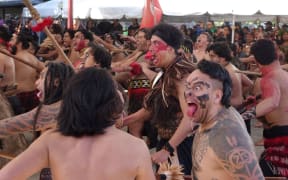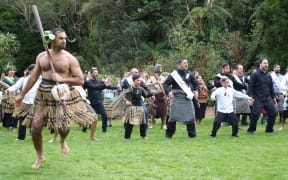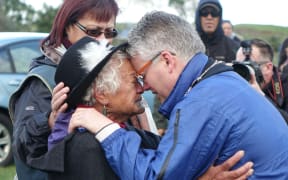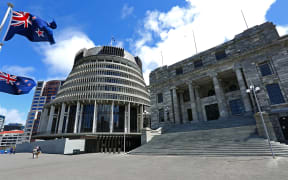Iwi and hapū members looked on today as three treaty settlement bills for Taranaki passed their third and final readings.

Taranaki Tuturu - one of the three tribal groups represented today - signed its $70 million treaty settlement at a ceremony, pictured, in New Plymouth on 7 July 2015. The other two bills that passed today were for Ngāruahine and Te Ātiawa. Photo: RNZ / Robin Martin
The passage of the bills was held up two months ago by New Zealand First, which, at the last minute, pulled its support.
However, there was no stopping the readings today as tribal members filled the public gallery of Parliament.
Representatives of Ngāruahine, Te Ātiawa and Taranaki Tuturu sang songs and performed a poi and a haka as the bills were passed, giving legislative effect to their settlements to address the historical injustices inflicted on their people.
In their settlement, Ngāruahine will get $67.5 million, the option to buy 12 sites, and two South Taranaki District Council properties and four culturally significant sites will be returned.
Te Atiawa will get $87m, the option to buy 51 land-banked properties, first right of refusal over specified Crown properties and joint vesting - with Taranaki iwi - of Ngā Motu (Sugar Loaf Islands).
Taranaki Tuturu will get $70m, the return of 29 sites of cultural significance, the option to buy 29 commercial properties and first right of refusal over Crown-owned land in its area.
MPs stood in the house during the readings and gave emotional accounts of the killings and land losses all three iwi suffered.
Treaty Minister Chris Finlayson said the bills were one way to acknowledge the history of Taranaki and place it in the permanent record so every New Zealander knew what had happened.
The Māori Party reiterated its call for the history of the New Zealand Wars to be taught in schools.
Māori Party co-leader Marama Fox said the land wars started in Taranaki, in battles that shaped this country and its people
"The people of Taranaki gave us the story of Parihaka, and Parihaka gave us amazing leaders like Te Whiti o Rongomai - who, in turn, gave the world passive resistance, a peaceful approach to fighting injustices that was then adopted by renowned Indian peace leader Mahatma Gandhi.
"Everyone knows Gandhi but they don't know Te Whiti," she said.
"We owe it to Taranaki to remember their stories."
Green Party Māori development spokesperson Marama Davidson said: "Not only has this been a decades-long struggle for resolution, in which many of the claimants, kuia and kaumatua have already passed on, but even at the last minute the Crown moved the goal posts and shifted the date for the third reading."
As well as financial redress, all three settlements include a Crown apology for its actions in the three decades following the signing of the Treaty of Waitangi in 1840.
The Crown apologised for its role in the outbreak of war in Taranaki, and specifically for its use of scorched earth tactics, which it acknowledged had devastated crops, livestock and food stores.
NZ First MP Pita Paraone talked about his party's concerns that the three bills would make iwi appointments to the regional council compulsory
Many iwi members in the public gallery cried during the proceedings, and many MPs said they hoped the settlements would be the start of a new beginning for all Taranaki iwi and hapū.







